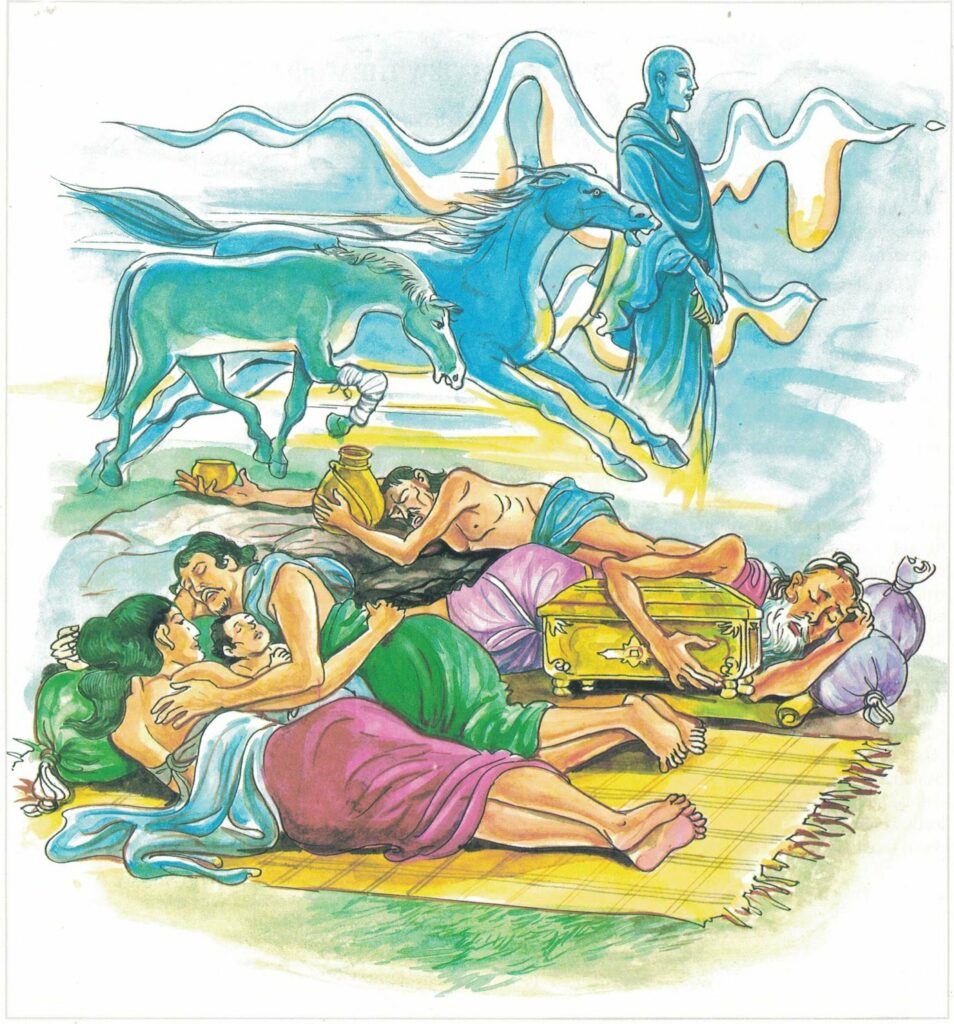Pali text, illustration and English translation of Dhammapada verse 29:
appamatto pamattesu suttesu bahujāgaro |
abalassaṃ’va sīghasso hitvā yāti sumedhaso || 29 ||
29. Among the heedless, heedful, among the sleepy, wide awake. As the swift horse outruns a hack so one of good wisdom wins.

The Story of the Two Companion Monks
While residing at the Jetavana Monastery, the Buddha spoke this verse, with reference to two monks, who were friends.
It appears that these two monks obtained a Meditation topic from the Buddha and retired to a forest hermitage. Early in the morning one of them brought firewood, prepared the charcoal dish, and during the first watch sat and chatted with the probationers and novices. The other, a heedful monk, engaged in meditation, thus admonished his friend, “Brother, do not act thus. For a monk that is heedless stand ready four states of suffering, as if they were his own house. The favour of the Buddhas may not be won by double-dealing.” When the lazy monk paid no attention to his admonition, the zealous monk said, “This monk cannot endure to be spoken to.” Having failed to spur his comrade to greater effort, the zealous monk, abiding in heedfulness, resumed his meditations.
The slothful Venerable, having warmed himself during the first watch, entered the monastery just as his friend, having finished his walk, entered his cell. Said the slothful monk to the zealous monk, “Slothful one, you entered the forest for the purpose of lying down and sleeping. Seeing that you obtained a Meditation topic from the buddhas, ought you not rather to rise and devote yourself to the practice of meditation?” So saying, he entered his own place of residence, lay down, and went to sleep. But his friend, after walking up and down during the first watch and resting during the second watch, rose in the last watch and devoted himself to the practice of meditation. Living thus the life of heedfulness, in no long time he attained Arahatship, together with the Supernatural Faculties. The other monk, however, spent his time in utter heedlessness.
When the two monks had completed residence, they went to the Buddha, paid obeisance to him, and sat down respectfully on one side. The Buddha exchanged friendly greetings with them and queried, “I trust that you have lived the life of heedfulness and that you have devoted yourselves earnestly to the practice of meditation. I trust that you have reached the goal of the Religious Life.” The heedless monk replied, “Venerable, how can this monk be said to be heedful? From the time he left you he has done nothing but lie and sleep.” “But you, monk?” “I Venerable, early in the morning brought firewood and prepared the charcoal-dish, and during the first watch I sat and warmed myself, but I did not spend my time sleeping.” Then said the Buddha to the slothful monk, “You who have spent your time in heedlessness say, ‘I am heedful.’ You mistake heedlessness for heedfulness. Compared with my son, you are like a weak and slow horse; but he, compared with you, is like a fleet-footed horse.”
Explanatory Translation (Verse 29)
pamattesu appamatto suttesu bahujāgaro
sumedhaso sīghasso abalassaṃ iva hitvā yāti.
pamattesu: among the unmindful; appamatto [appamatta]: the mindful one; suttesu: among those who are asleep; bahujāgaro [bahujāgara]: the wide awake; sumedhaso [sumedhasa]: the blemishless one of deep wisdom; sīghasso [sīghassa]: a fast horse; abalassaṃ iva: as a weak horse; hitvā: leaving behind; yāti: forges well ahead.
The extremely wise individual of deep wisdom is always alert and mindful. He is therefore like a wide-awake individual among those who are deep in sleep. That wise person, who possesses supreme insight overtakes in spirituality all those ordinary masses, just as a fast horse easily overtakes a weak one.
Commentary and exegetical material (Verse 29)
hitvā yāti: leaves behind; defeats; overtakes. These are the central ideas of this stanza. The concept enshrined in this stanza is that those who are alert and mindful overtake others who are lethargic and unalert. To emphasize this notion several analogies are shown. The sleepless person is wide awake while others are sleeping away their time. The disabled horse is overtaken by the fleet-footed. In that manner the alert person overtakes those others who are heedless and flagging in spirit. This way the wise ones very easily overtake the less intelligent, foolish individuals who are not their equals. Among the truth-seekers those who are steadfast in their search overtake others in spiritual attainments. They also discard the work-a-day world.
Heedful amongst the heedless, wide awake amongst the slumbering, the wise man advances as does a swift horse, leaving a weak jade behind.